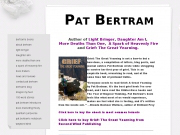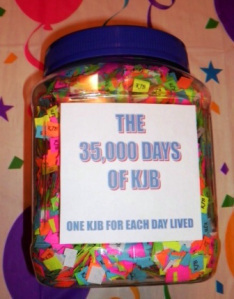Pat Bertram's Blog, page 250
December 9, 2012
Is a Blog or a Website Better for Reaching Out to Readers?
 A new author with little internet experience and no money recently asked me which he should set up, a website or a blog, and which was better for reaching out to readers.
A new author with little internet experience and no money recently asked me which he should set up, a website or a blog, and which was better for reaching out to readers.
As for which is better to reach out to readers, a blog is. A website is generally static. A blog is a fluid site that is updated frequently, and sites that are updated frequently get better exposure in search engines. Also, a blog is a place where author and reader can communicate instantaneously. It doesn’t always work that way, of course, because first you need readers to communicate with, but that also holds true for a website — generally, you need readers first. Just because you have a website doesn’t mean that anyone will see it.
I have a website (http://patbertram.com) but I seldom update it unless I have a new book available or other such news. It’s mostly there just to be there, a landing place for people who Google me or my books. I paid for the domain, but not much else — I even used a template to make it easier to set up. Still, it does exactly what I want it to do — let people know that I am an author, what books I’ve written, and where they can buy them.
This blog doesn’t have a domain name — I’m sticking with ptbertram.wordpress.com for now. Some people say it’s unprofessional, but it gives me what I need — a place to write about what comes to mind each day, a place to talk about what matters with those who follow this blog, and a place to promote my books. (In case you didn’t realize it, all the books on the right side bar are mine.) In fact, if I’m asked for a website when I comment on a post, I use this blog for a web address rather than my official author site. Not only does this blog show my books and bio, my posts reveal way more about me than my website does.
I recently found out I’ve been doing this website/blog stuff all wrong. (So feel free to disregard everything I’m saying.) Each of my blogs should be a subdomain of my website, so that combined they get a higher ranking than each separately, but then I would need to pay a yearly fee for a domain name for each blog, and I’d have to hire someone to set it up for me. If I ever become a world famous writer with sales in the millions, then perhaps it would be necessary to do things right, but for now, I’d rather just have fun playing with my blogs and letting the website take care of itself. Besides, this way I can do it all myself.
As for deciding which to set up, a blog or a website, that’s an easy choice to make. A blog is a website. If you set up a wordpress blog, pay for a personal domain name, and set up a static landing page, then you have both a website and a blog. http://lazarusbarnhill.wordpress.com and http://rubiconranch.wordpress.com are blogs set up as websites, though as you can see neither paid for their own domain name.
(To set up a static front page on your wordpress blog, write your post as always. Then go to “Visibility: Public” on the right hand side of the page, click on edit, and check “stick this post to the front page.” Then publish the post as always. If you want to set up an already published post as a sticky post, you can edit the post, edit the visibility, and then click “update”.)
As with everything else on the internet, setting up a blog or a website or both can be as easy or as involved as you want it. Me? I choose easy every time.
***
Pat Bertram is the author of the suspense novels Light Bringer, More Deaths Than One, A Spark of Heavenly Fire, and Daughter Am I. Bertram is also the author of Grief: The Great Yearning, “an exquisite book, wrenching to read, and at the same time full of profound truths.” Connect with Pat on Google+
Tagged: blog or website?,

December 8, 2012
The One and Only 35,000-Day Celebration
In a previous post, I talked what I could do to celebrate my father’s 35,000th day because truly, such an astonishing number should not go unacknowledged. I finally decided on 35,000 KJBs (his initials), one to represent each of his days. Took me twelve hours to cut them out, but it was worth it to see a visual representation of all those days.

Other gifts were 35,000 “I love you”s from my sister, and 35,000 sequins to add sparkle to the day from my brother. (I covet those sequins. They are all different shapes and sizes, such as butterflies, flowers, stars, and teardrops, and definitely should add plenty of sparkle to . . . whatever. Any suggestions?)
More than anything, I got a kick out of making a deal over the day. I mean, really . . . how many 35,000-day celebrations have you attended? I have a hunch this was the one and only such party.

If you’d like to know how many days old you are, you can calculate it here: Decimal Birthday.
***
Pat Bertram is the author of the suspense novels Light Bringer, More Deaths Than One, A Spark of Heavenly Fire, and Daughter Am I. Bertram is also the author of Grief: The Great Yearning, “an exquisite book, wrenching to read, and at the same time full of profound truths.” Connect with Pat on Google+
Tagged: 35000 days, 35000 days old, celebration, sequins


December 7, 2012
Rubicon Ranch: Necropieces — The Story Continues
 Rubicon Ranch is a collaborative and innovative crime serial set in the desert community of Rubicon Ranch and is being written online by the authors of Second Wind Publishing. Seven authors, including me, are involved in the current story — Rubicon Ranch: Necropieces.
Rubicon Ranch is a collaborative and innovative crime serial set in the desert community of Rubicon Ranch and is being written online by the authors of Second Wind Publishing. Seven authors, including me, are involved in the current story — Rubicon Ranch: Necropieces.
Residents of Rubicon Ranch are finding body parts scattered all over the desert. Who was the victim and why did someone want him so very dead? Everyone in this upscale housing development is hiding something. Everyone has an agenda. Everyone’s life will be different after they have encountered the Rubicon. Rubicon Ranch, that is.
Although some of the characters were introduced in Rubicon Ranch: Riley’s Story, a previous collaboration, Rubicon Ranch: Necropieces is a stand-alone novel. A new chapter is posted every Monday.
We hope you will enjoy seeing the story develop as we write it. Whodunit? No one knows, not even the writers, and we won’t know until the very end!
Chapter 25: Melanie Gray
by Pat Bertram
Melanie paced her rented house, wandering through the great room to the bedroom, then up the stairs to her loft office to stare out the window. The clouds that had skirted Rubicon Ranch all day yesterday had settled over the town in the early morning hours. The rainstorm had now weakened to a soft drizzle, but floodwaters were swirling out of the desert and down the middle of the street like dirty bath water in search of a drain.
Melanie half expected to see body parts floating by, but it had been forty-eight hours since she had found the ravens breakfasting on the disembodied foot, so perhaps by now all the necropieces had been discovered. Shivering, she turned from the window, trudged down the steps to the great room and then into the bedroom. She’d spent most of the fifteen weeks since Alexander’s death roaming the desert, and she found it almost impossible to relax during this enforced incarceration. If she were any kind of photographer instead of an amateur shutterbug, she’d be out in the desert despite the rain, chronicling the way the runoff was recreating the desert floor, but her tiny camera wouldn’t stand up to the moisture, and then where would she be?
She plodded back through the great room and up the stairs again. Her cell phone rang, and for just a second, her spirits rose. Alexander! He was finally calling to tell her he was coming back. Just as abruptly, the realization that he was dead hit her like a physical blow, and tears spilled down her cheeks. Why couldn’t she remember that he would never come home? His body had been cremated and the ashes stored in a square brass urn sitting atop the dresser until she could take them high up into the Rocky Mountains in Colorado and scatter them.
By the time she reached her bedroom where she’d left her cell phone on the nightstand, the phone had stopped ringing. The tiny screen showed the number for her agent, and when the phone rang again, she considered not answering. What could the woman say that hadn’t been said a dozen times before? Melanie already knew her deadline had passed. She already knew she owed the publisher either the book or the return of the advance. She already knew . . . Oh, crap. It would be better to talk to Dottie and get it over with.
“Yes?” she said, hating the hesitancy she heard in her voice.
“Dahling!” Dottie chirped. “I’ve been calling and calling. Have I got good news for you! I’ve been talking to Jack, and he says you can have all the time you need to finish the desert book. He’ll even hire a photographer for you. And he’ll send you five hundred thousand dollars, though I’m sure I can get him up to a million.”
“What does he want from me? A kidney?” Jack Nolan, her publisher, had a reputation for wringing every last bit of creative effort from his authors while paying the least possible advance. He got away with it because, despite his miserly ways, he was scrupulously honest, remitting every penny of the royalties his authors earned.
Dottie chuckled. “So cynical, dahling. It’s perfect, really. You’re there. You know the people and the place. And from what I understand, you live next door to the Sinclairs.”
“No,” Melanie said, without a hint of uncertainty in her tone.
“You don’t live next door to them? My sources—”
“I mean, no. I will not write whatever book Jack wants me to write. I’m going to finish the desert book and then . . .”
“And then what? Knowing Alexander, he probably left you not only broke but also in debt. Someone is going to write the book about Morris Sinclair. It might as well be you.”
“Wait a minute,” Melanie said. “How do you know what’s going on here?”
Dottie laughed. “The whole world knows. It’s everywhere. On television, Facebook, Twitter. It’s such a delicious story. The author of the infamous ‘Necropieces’ series has himself become a series of necropieces. His fans don’t believe he’s permanently dead. They are holding vigils, waiting for him to come back to life. And his head was found in the house where that little girl died. Riley? Is that her name? The girl that was kidnapped as an infant and then killed by her biological father? How can you not want to write the story of Rubicon Ranch? It’s going to be huge. Humongous.”
“Not interested.”
“Wait! There’s more!” Dottie said. “You gotta love this stuff. One of the suspects in Morris’s murder is Tara Windsor.”
“Who?” Melanie asked.
“You had to be living out in the boonies somewhere not to have heard of Tara. Oh, right—you’ve been out of the country for the past umpteen years. Tara is an actress. She was in that movie with that actor, you know, the one with the gorgeous abs? No, I guess you don’t know. Anyway, it turns out the suspect isn’t Tara at all. Tara is in Cabo with her pool boy. Don’t you just love it?”
Melanie sank down onto the bed, suddenly weary. “No.”
“And then there’s you,” Dottie said slyly.
Melanie sat up straight. “Me? What about me?”
“The cops say you’re a suspect. You knew that, right? Jack says if you killed Morris and tell all the gory details, he’ll up your advance to two million.”
A suspect. Melanie had presumed the Sheriff’s insinuation that he considered her a suspect was his way of manipulating her and keeping her off balance, but if he or someone in the Sheriff’s department had given out her name, then she really had a problem. She heard the echo of herself screaming at Morris, “You leave me alone, Sinclair, or I’ll be shooting your dead body parts.” Could she have been more foolish?
“Do you know a good lawyer?” She gave a small laugh, wanting Dottie to think the question a joke, but fear clutched at her belly with clammy fingers. Maybe she’d have to write Morris’s story in order to pay for a defense attorney.
“You might not be a celebrity on a par with Morris or Tara,” Dottie said, “but you and Alexander have quite a following. Since there’s been mention of your involvement in Alexander’s death—”
“Who told you I was involved in Alexander’s death?” Melanie demanded.
“Just a guess.” Dottie voice sounded smug, as if she’d caught Melanie out in a secret. But there was no secret when it came to Alexander’s death. Just shoddy police work. “So many important deaths in such a small place make for a good story,” Dottie added.
“All the deaths are unrelated,” Melanie pointed out.
“Perhaps, but it’s more likely they are connected somehow. After all, Morris had autopsy photos of that little girl, and Alexander took some photos of necropieces for Morris.”
“You knew about that?”
“Alexander accidentally included a couple of the pictures when he sent Jack a batch of desert photos.”
Melanie sighed. “Maybe you’re right. Maybe Alexander’s death had something to do with Morris and the evil that this place seems to bring out in people.”
“So can I tell Jack you’ll write the book if he gives you an advance of a million dollars?”
“No. But you can tell him I’ll consider it.”
“Good girl. I’ll see what I can do about finding you a lawyer.”
Melanie set the phone on the nightstand, and put her head in her hands. Oh, Alexander. Look what you’ve done to me. She took a few deep breaths, determined not to cry, but when the tears spilled over anyway, she jumped to her feet, ran up the stairs, and plopped in front of the computer. Immersing herself in research always helped take her mind off herself, and she needed to know more about Morris before she could give Dottie her decision.
Typing “Morris Sinclair” into her search engine resulted in over two hundred million hits. Morris’s website. Book and movie sites. Thousands of fan sites and cult groups. Blogs. Articles. She narrowed her search to “Morris Sinclair biography” and managed to piece together the story of a highly narcissistic and anti-social man in his late sixties who had started out as a normal kid, turned into a troubled and rebellious teenager, and grew into a sadistic beast during his tour of duty in Vietnam.
After Vietnam, Morris married a woman he’d only known for a few weeks. He worked as a roughneck on an oilrig and wrote tales of terror on the side. When the stories were published, they found an immediate readership. He quit work to write fulltime.
Morris and his wife had three children, two boys and a girl. His wife committed suicide while the children were very young. Or perhaps Morris had killed her? That made more sense to Melanie—what mother would kill herself and leave her children to be raised by the devil incarnate?
Although the thought of a million dollars and the freedom it could buy tempted her, Melanie did not want to spend the next few months of her life immersed in the evil that was Morris. She was all set to call her agent and turn down the deal, when the doorbell rang.
She opened the door to find Lieutenant Frio and Deputy Midget standing on her doorstep, their faces set as if in stone.
“Ms. Gray,” Lieutenant Frio said, “we’d like for you to come with us. Sheriff Bryan wants to talk to you.”
Melanie held out her hands, wrists together, but Deputy Midget shook his head. “Sheriff Bryan says not to cuff you unless you give us trouble.”
“Can I get my coat?”
Lieutenant Frio threw Melanie a stern look. “You’re not going to try anything?”
“No.” Melanie darted into the bedroom, grabbed a trench coat from the closet and tucked her phone in the pocket.
Sandwiched between the two law officers, Melanie marched out to the tan Navigator parked at the curb in front of her house. Deputy Midget opened the back door of the vehicle, put a hand on her head to guide her through the opening as if she were a common criminal, then lowered himself into the front passenger seat. The right side of the Navigator sank, and the tires seemed to scream out for relief.
Lieutenant Frio peeled away from the curb. The tires sent up huge plumes of floodwaters that broke over the vehicle, and made it seem as if they were driving through a car wash.
Melanie stared out the window, though she couldn’t see anything but the backwash of water. If she strained her ears, she felt sure she could hear Alexander’s ghostly laughter. During all their years of living in countries with no civil liberties, they had never had a single problem with the authorities, and yet now, not even four months after his death, she found herself at odds with the law.
Maybe this arrest was just another of the sheriff’s games? She had never known what he wanted from her, though when they met after she’d found Riley’s body, he had focused his attention on her, and made her feel . . . seen. No one but Alexander had ever looked at her that closely, and even Alexander had stopped paying attention to her years before. Or maybe what had seemed like manipulation—the sheriff concentrating his attention on her and then ignoring her—had all been in her head, a widow’s cry to be noticed.
Once they hit the dry road of the highway, the thirty miles to Rojo Duro seemed to slip past in an instant. Deputy Midget ushered Melanie to a small room with two chairs and a metal table bolted to the floor, and left her alone.
A mirror on one wall had to be a one-way window, but Melanie put a finger against the glass to be sure. Finger touching finger without any space told her the truth—anyone could be watching her from the other side, and she would never know. She resisted the urge to stick out her tongue in a childish show of temper. Instead, she sat tall in a chair, hands folded on the table, and tried not to think of where she was. Tried not to think of her pathetic life. Tried not to think of her uncertain future.
Nine minutes later, Sheriff Bryan entered the room and locked the door behind him. He perched one hip on the table, and stared at her, no friendliness in his eyes.
After a long moment, he heaved a sigh and said, “Why did you do it, Melanie?”
***
Pat Bertram is the author of the suspense novels Light Bringer, More Deaths Than One, A Spark of Heavenly Fire, and Daughter Am I. Bertram is also the author of Grief: The Great Yearning, “an exquisite book, wrenching to read, and at the same time full of profound truths.” Connect with Pat on Google+
Tagged: grief and loss, online novel, Rubicon Ranch, Rubicon Ranch Necropieces, Second Wind Publishing


December 6, 2012
Allowing Myself to Dream
 Yesterday I wrote about Living Each Day We Are Given and how there will come a time when I am free from my current concerns. People think I should be preparing for that future, planning what I am going to do, where I am going to go, and how I am going to live. Each person has his or her own suggestion as to what form that preparation should take, such as my going back to school either to situate myself anew in the job market or to take advantage of student loans. Others think I should be researching places to live, but the truth is, I am tired of planning. I’d like to be bold without being foolish, adventuresome without being reckless, but most of all, I’d like to be spontaneous without being flighty. In other words, I’d like to stretch myself to see what I’m made of without putting myself in danger, and I can’t do that if I immediately go from one planned life to another.
Yesterday I wrote about Living Each Day We Are Given and how there will come a time when I am free from my current concerns. People think I should be preparing for that future, planning what I am going to do, where I am going to go, and how I am going to live. Each person has his or her own suggestion as to what form that preparation should take, such as my going back to school either to situate myself anew in the job market or to take advantage of student loans. Others think I should be researching places to live, but the truth is, I am tired of planning. I’d like to be bold without being foolish, adventuresome without being reckless, but most of all, I’d like to be spontaneous without being flighty. In other words, I’d like to stretch myself to see what I’m made of without putting myself in danger, and I can’t do that if I immediately go from one planned life to another.
Still, I am preparing for my future, though it might not seem like it. I am exercising and trying to eat right, taking yoga classes and going for long rambles in the desert. And I’m pitching ideas, trying them on for size.
I’ve always had a sense of my strengths and weaknesses, but I don’t want to take those strengths and weaknesses into consideration. I want to throw myself wide open and envision a life of endless possibilities, at least to begin with. It won’t be long before the realities slowly creep back in. I’m not elderly, but I’m not young, either. I’m not indolent, but I’m not athletic. (I’m smiling to myself as I write this. I had to rewrite the word indolent a half a dozen times because each time I inadvertently wrote insolent. I’ve never been insolent, never liked hurting people, so I have no idea where the subconscious desire for insolence came from.)
I’m not much of a daydreamer, living fantastic adventures in my head. I’ve always been too practical and pragmatic to want what is unattainable. Never been one to want much of anything, to tell the truth. Many women in my situation gave up their own dreams when they got married, and now that their husbands are dead, they are picking up those original dreams and running with them. I have no such abandoned dreams, but many things will be open to me in my new life that would have been inconceivable in the old one, and I need to allow myself to dream so I can become receptive to those possibilites.
Do I want to hop a plane and fly to Britain, with no real plans of what to do when I get there, just see what happens? Do I want to hole myself up in a garret and write incredibly wise and witty books? Do I want to enroll in classes — Tai Chi or calligraphy perhaps? Do I want to get rid of my stuff or put it into storage, and take to the roads? Do I want to . . . ?
There is a chance that I will move back to Colorado and settle down, but now that I am on my own, settling down seems too much like stagnating, and stagnation terrifies me. I don’t want to end up like one of those old woman who sits in her dark apartment, alone, with the whole bright world outside her door. And yet, and yet . . . there is the small matter of a lack of funds and the large matter of a laid-back nature more suited to a life of contemplation than a life of action.
So now I’m throwing my heart out into the world of possibilities in the hopes that someday the rest of me will follow.
***
Pat Bertram is the author of the suspense novels Light Bringer, More Deaths Than One, A Spark of Heavenly Fire, and Daughter Am I. Bertram is also the author of Grief: The Great Yearning, “an exquisite book, wrenching to read, and at the same time full of profound truths.” Connect with Pat on Google+
Tagged: daydreamer, dreaming of the future, dreams, preparing for the future, world of possiblities, yoga


December 5, 2012
Living Each Day We Are Given
 I’m noticing a change in my attitude lately — more cynical perhaps, and at the same time more optimistic about the future. This change showed itself to me in my reaction to a news story that is going around about a couple who holds the record for the longest marriage — 86 years. The story purported to tell the secrets of how they stayed together for so long, and my first thought was, “Because one of them didn’t die.” No matter how much they love each other, no matter how well they get along, if one of them had died, that would have been the end of their being together.
I’m noticing a change in my attitude lately — more cynical perhaps, and at the same time more optimistic about the future. This change showed itself to me in my reaction to a news story that is going around about a couple who holds the record for the longest marriage — 86 years. The story purported to tell the secrets of how they stayed together for so long, and my first thought was, “Because one of them didn’t die.” No matter how much they love each other, no matter how well they get along, if one of them had died, that would have been the end of their being together.
Immediately following my cynical thought was a moment of horror at the idea of being stuck in the same sort of life for all those years. She married very young, so what did she know of life (or herself) before making her vows? And she’ll never have a chance of exploring what she could have been on her own. The universal reaction to the story seemed to be “Oh, how sweet,” so the horror I felt must not reflect their situation but my own changing attitude.
My soul mate and I always thought we would die together since our bond was so strong, and yet, here I am and he is not. The pain of our separation was almost more than I could bear at times, and in fact, sometimes the only way I could get through another minute of continued life was to scream my pain into the wind.
Now, as I pass through to the other side of grief, continuing to process all the various emotions, fears, regrets, guilts, I sense that a new life awaits me, a life of possibilities, maybe even adventure. I don’t know what form this life will take, whether it will entail geographical travels or spiritual travels, new activities or new perspectives, broadening my horizons or only broadening my mind. But a new life is surely coming, and sometimes my heart leaps ahead of me at the thought of such freedom.
I’m not yet at that place of freedom. I still have many concerns to deal with first. Since I am looking after my 96-year-old father, that is my prime concern, but there are also personal concerns such as my continued awareness of my mate’s death. I know he would be the first to applaud my coming adventures — he felt bad that the constraints of his illness and the life we were forced to live destroyed my spontaneity, but the truth is, he gave me the courage to be spontaneous in the first place. And now I’ll have to find the courage to be spontaneous on my own.
It’s a difficult line to walk — being glad of a chance at a different sort of life while at the same time not being glad of the death that will allow such a life, being glad of one more day of life while being aware that such a day was denied him. But I will find a way to handle it as I have handled every step of this grief journey.
Maybe the secret isn’t how to stay together, but how we live each day we are given, whether with someone or alone.
***
Pat Bertram is the author of the conspiracy novels Light Bringer, More Deaths Than One, A Spark of Heavenly Fire, and Daughter Am I. Bertram is also the author of Grief: The Great Yearning, “an exquisite book, wrenching to read, and at the same time full of profound truths.” Connect with Pat on Google+
Tagged: being together, staying together, surviving grief


December 4, 2012
Death and Dying: Good-bye Experiences
 During the past thirty-two months since the death of my life mate/soul mate, I have shared my grief, and in turn others have shared their grief with me, telling me stories they never told anyone else. I have heard incredible tales of signs and dreams and feelings of connection to the one who has left earthly life behind, which makes me realize that something is going on beneath the surface of earthly life, though I don’t know what.
During the past thirty-two months since the death of my life mate/soul mate, I have shared my grief, and in turn others have shared their grief with me, telling me stories they never told anyone else. I have heard incredible tales of signs and dreams and feelings of connection to the one who has left earthly life behind, which makes me realize that something is going on beneath the surface of earthly life, though I don’t know what.
Although I concede that near death experiences exist, I do not believe that NDEs are necessarily an encounter with those who are dead. We humans are so incredibly complex, that these experiences could be an as yet unknown state of consciousness, such as a dream state, or maybe even a dip into the collective consciousness. I’ve heard of too many people who saw the white light, saw their loved ones begin to draw near and then immediately recede as the nearly dead person returned to consciousness. It seems peculiar to me that the dead have nothing better to do than wait for someone to begin to die, to hurry and don their earthly bodies to rally round on the off chance that the person will die, and then shrug off their earthly personas and go back to doing whatever their disembodied selves were doing before being called to reception duty.
On the other hand, there have been an incredible number of instances of people saying good-bye before they left the earth for good.
Sometimes the good-byes were said while the people were still alive. I’ve heard many stories of perfectly healthy people who visited and called family and friends they hadn’t seen in a while, and then a few days later they had an accident or a heart attack and died. It was as if part of them knew they were going to leave this earth, and they were saying good-bye even though they didn’t consciously realize that is what they were doing.
Sometimes the good-byes were said after the people were dead. A boy’s grandmother stopped by to tell him that she would be okay and not to spend his life in sadness. A woman whose husband died in an accident never got a chance to say good-bye before the hospital removed his body, but that night, she felt a kiss on her cheek and his whispered words that it didn’t matter, that he’d already been dead when he reached the hospital. A woman who swam too far out into the ocean and was floundering in panic heard her mother tell her to relax, that she would be okay, and later found that her mother had died at that very moment. A woman who lost her husband had incredibly rich and coincidental experiences every Monday during the first six months after he died. She could even feel his anger, but now, eighteen months later, he is finally leaving her alone to find her own way.
And sometimes the messages come in dreams. One daughter planned to move in with her mother, and that night her father visited her in a dream and said he was glad, that her mother needed her. (The daughter told her mother to tell her father to stay out of her dreams.)
Even I had a good-bye experience. Two of them, actually.
For the last year of his life, my love and I argued about what I would do afterward. He thought I should go stay with my father where I would be safe and warm and fed, but I could not bear the thought of doing so. I’d just finished caring for one dying man, and I didn’t want to look after another. While he was in a coma during his last days, however, I finally decided to follow his wishes and come stay with my dad, and I told him so. Just a few hours later, he died.
At the moment of his death (or rather, when his breathing and his heart stopped), I did not feel anything except a moment of relief that his suffering was over. I watched the nurses clean his body and shroud it in a blanket, then I waited numbly for the funeral director. After she took away his body (in a black SUV, not a hearse), I left. The highway was dry, but about halfway home, my car suddenly went careening, around and around, back and forth, totally out of control. (I assumed I hit a patch of black ice, but that was such a peculiar night, I can’t say for sure.) I thought I was going to die, but oddly, I never left the road. The car finally came to a halt facing the wrong way on the highway. I was fine. So was the car. As I sat there gripping the wheel, I wondered if he had stopped by on his way out of this world to save me, to leave me a final reminder to be careful, or maybe give a shake of his ghostly head at this evidence of my carelessness. (He always worried that I wasn’t careful enough.) I remember feeling him leaving this earth — like a breath passing over head — but to be honest, I don’t know if I really felt his leaving at the time or if the impression was something my mind created later to explain the bewildering event. It was after this particular near death experience (as out of control as the car was, it truly is amazing that I survived intact), that the feeling of his goneness slammed into me, and I never again have had any sense of his presence in my life.
What was he doing for those hours before he left this earth? Finishing his dying, possibly. Closing down systems of the body and brain that have yet to be discovered. From grief, I have learned the power of our lizard brain, learned that there is way more to the brain — and human biology, psychology, and consciousness — than is in our textbooks.
So what does all this mean? I don’t know, and that’s the truth of it.
***
Pat Bertram is the author of the conspiracy novels Light Bringer, More Deaths Than One, A Spark of Heavenly Fire, and Daughter Am I. Bertram is also the author of Grief: The Great Yearning, “an exquisite book, wrenching to read, and at the same time full of profound truths.” Connect with Pat on Google+
Tagged: encounters with the dead, near death experiences, saying good-bye, saying goodbye to the dead, unknown state of consciousness, white light


December 3, 2012
Getting Freshly Pressed. “What? Like It’s Hard?”
A couple of nights ago I got an email from WordPress. The message said:
Hi there Pat Bertram,
Congrats! We’ve picked your post ( http://ptbertram.wordpress.com/2012/11/27/thirty-two-months-of-grief/ ) to appear on Freshly Pressed on the WordPress.com home page.
Thanks for sharing this — it’s simple, succinct, and quite touching. It will appear on Freshly Pressed in the next day or two, so get ready to welcome your new readers.
This line caught me in partic ular: “My emotions are on a slow Ferris wheel ride, usually sliding down into sadness on Saturdays, the day he died — a day that apparently is etched in my very psyche — and then a gradual climb to hope and possibility on Monday and Tuesday.”
ular: “My emotions are on a slow Ferris wheel ride, usually sliding down into sadness on Saturdays, the day he died — a day that apparently is etched in my very psyche — and then a gradual climb to hope and possibility on Monday and Tuesday.”
FYI, I noticed a typo: “I find it impossible to pretend that this new experience of life alone is positive thing.” >> Add “a” before “positive”?
Thanks for making the internet a more interesting place!
–WordPress.com
***
I’ve been Freshly Pressed three other times: I Am a Three-Month Grief Survivor, I Am a Six-Month Grief Survivor, and A Perfect Grasp of Storytelling, so when I read the email, I chuckled to myself and thought, “What? Like it’s hard?” (Remember Reese Witherspoon’s line in Legally Blonde. Her ex-boyfriend says in amazement, “You got into Harvard Law?” and she responds, “What? Like it’s hard?”)
I don’t mean to be facetious, because getting Freshly Pressed is hard. There are a more than a million new posts every day from a half a million bloggers. Most people won’t get pressed once, let alone three or four times.
All four times, the honor came as a surprise, but the truth is, I had prepared for such an eventuality by following the guidelines in “So You Want To Be Freshly Pressed.” Until I read that article, I’d never used photos in my posts, but now taking the perfect photo to accompany my words has become an art in itself. I’ve always aimed for eye-catching headlines and typo-free text (oops, I missed one this time, but luckily they caught it), but I don’t always have a strong point of view. (I don’t much like contention.) Apparently, though, I’ve managed to strike the right chord with the WordPress editors four times, and you can, too. Just keep blogging, telling your truth, letting yourself be vulnerable, and your day will come.
***
Pat Bertram is the author of the conspiracy novels Light Bringer, More Deaths Than One, A Spark of Heavenly Fire, and Daughter Am I. Bertram is also the author of Grief: The Great Yearning, “an exquisite book, wrenching to read, and at the same time full of profound truths.” Connect with Pat on Google+
Tagged: "What? Like it's hard?", adding photos to blog posts, freshly pressed, Legally Blonde, Reese Witherspoon


December 2, 2012
How many subplots in a novel are acceptable?
In my Suspense/Thriller Writers’ group on Facebook, one author asked, “How many subplots in a book are acceptable?”
Most of the writers thought that one or two subplots was enough, but horror writer Rob M. Miller gave a wonderful response that I’m reposting here. Considering the ephemeral nature of Facebook, in a couple of days his comment would have disappeared into the great maw of FB, and I didn’t want it to be lost forever. Rob said:
A broad question begging for a broad answer, of which there is only one that’s truly honest, even if horribly vague:
As many as the author can competently handle.
In the hands of a master, there can be many subplots, even into the double and triple digits, as can be read in the incredible work Shogun by James Clavell, or The Hobbit by Tolkien.
But to have a masterful work, there doesn’t have to be many in order to keep the reader hooked and hungry for — One…More…Chapter!
Wiki Answers says that “subplot is like the secondary plot of your story. It means additional plot(s) to a movie, show, book, or play that help contribute to the main plot. Subplots are less important than main plots.”
 In Star Wars you have the following plot or through line: Ragtag rebels work to stop a space station from cementing the evil emperor’s hold on the galaxy.
In Star Wars you have the following plot or through line: Ragtag rebels work to stop a space station from cementing the evil emperor’s hold on the galaxy.
That’s the plot. The spine. It’s the elevator speech, as well. Short, simple, and concatenates the story. But it’s also a bit simple — isn’t it? — even for Star Wars, which is not the most complex of stories.
How many subplots are in Star Wars?
I concede the number could be argued, but c’mon, fellow writers, there is more than one, and there is more than two. The mentoring of Luke, Chewie and Han as wanted criminals (smugglers), the romantic tripod of Leia, Han, and Luke, and in my view, even more.
Subplots, mini plots, lines of suspense, how many characters there should be and the proper ratio of bad to good. These things can all be made as complicated as desired, or as complicated as hell even when not desired.
The key is to simplify the approach, at least in one’s head, like with the through line given for “Star Wars.” The final product might be beautifully written and wonderfully controlled as an epic master work, such as Martin’s Song of Fire and Ice series, or Tolkien’s set of Hobbit adventures, or a chunky Tom Clancy novel . . . or it can be an equally wonderful, but streamlined story. There are no rules, save for don’t write boring. There are conventions, tropes, schemes and paradigms, some of more value than others.
What to do?
Author, know thyself, and then stretch 10%, putting down a tale as best you can, whether outlined or not, large-staged or mini, small cast or jam-packed.
If you want “one” of something, go for it. Shorts, for example, are a form that generally works better when they are a drag race from point A to B, and which end in a singular climax — but I’ve read exceptions. Perhaps your idea is an exception, too. But don’t be afraid of two, or forty-two. Keep track of stuff . . . be forgiving when it turns out that Hemingway was write about first drafts being shite, and then, like a conductor or architect, you can make sure that all the balls are being juggled properly.
***
[image error] With a love for reading and writing that started in his youth, Rob has traveled far to get to the place where he can now concentrate on breaking into the horror market.
Born and raised in the “micro-hood” of Portland, Oregon, he grew up as the oldest of three children, the son of a book-lover and a book-hater.
It was after two years of free-lance stringer work, and a number of publishing credits, that he tired of non-fiction and decided to use his love of the dark, personal terrors, and talent with words to do something more beneficial for his fellow man -– SCARE THE HELL OUT OF HIM.
Tagged: how many subplots are acceptable, Rob M. Miller, Star Wars, subplots, subplots in Star Wars


December 1, 2012
Talking About How Clothes Make the Character
I am a guest at Joan P. Lane’s Fashion Flashback blog, which is a great resource for readers and writers of historical fiction, and anyone else who has an interest in the history of apparel.
 Considering how little attention I pay to clothes in real life as well as in my fiction — I wouldn’t know a Manolo Blahnik, if it stomped on my foot, and in fact I had to Google the names of shoe designers to get a name to make this point — it doesn’t seem as if Joan’s blog would be a good fit for a guest post for me, but it turned out to be a wonderful experience. I talked about how clothes make the character, and many people left comments, which resulted in a rousing discussion.
Considering how little attention I pay to clothes in real life as well as in my fiction — I wouldn’t know a Manolo Blahnik, if it stomped on my foot, and in fact I had to Google the names of shoe designers to get a name to make this point — it doesn’t seem as if Joan’s blog would be a good fit for a guest post for me, but it turned out to be a wonderful experience. I talked about how clothes make the character, and many people left comments, which resulted in a rousing discussion.
In the post, I explained (among other things) how I used clothes in A Spark of Heavenly Fire. One of the dramatic clothes moments in this story of a state quarantined because of a dreadful disease, is when my clothes-conscious character has to wear blood-soaked clothes for added warmth. (Actually, I don’t think I portrayed her as clothes conscious so much as self-absorbed.)
Clothing can be used as part of the stage action to show the nature of character rather than just to dress him or her. In another scene in A Spark of Heavenly Fire, a girl polishes a fingernail with the edge of her crop top, and in doing so exposes her breasts. It wasn’t a deliberate or flirtatious act on her part. She was a receptionist, and was simply polishing her nails to show her oblivion of the client standing at her desk.
A third significant clothes moment in A Spark of Heavenly Fire goes to show the depth of a woman’s character. She is big, hearty, aggressive, with a braying laugh, yet she wears feminine clothes such as challis dresses and blouses with ruffles.
So you can see that even though clothes are not a big part of my fiction, with very few words spent describing the characters’ apparel, the clothes they wear do have an impact on the story.
You can find the guest post and the ensuing discussion here: Clothes make the character.
What about you? How do you use clothes to show character or to further the plot in your story? If you don’t currently use clothes except to keep your characters from running around naked, how could you better use apparel to further your story?
***
Pat Bertram is the author of the suspense novels Light Bringer, More Deaths Than One, A Spark of Heavenly Fire, and Daughter Am I. Bertram is also the author of Grief: The Great Yearning, “an exquisite book, wrenching to read, and at the same time full of profound truths.” Connect with Pat on Google+
Tagged: clothes and fiction, clothes make the character, clothes-conscious character, Fashion Flashback, Joan P. Lane, Manolo Blahnik

November 30, 2012
Is Cursive Handwriting Dead?


An article in today’s paper gave me pause. Cursive handwriting has one foot in the grave.
Remember this paper? (Photo credit: Wikipedia)
A debate wages as 45 states adopt school curriculum guidelines for 2014 that exclude cursive handwriting, but do require keyboard proficiency by the time students exit elementary school.
You can read the full article here, but some highlights are:
***
End reblogged article.
***
The above was an interesting article and an extensive discussion about cursive writing that I thought you might like to see. (This was one of my few attempts at reblogging, but if I ever do such a thing again, I'll do it by hand so I have more control of what is posted. There is no way for me to resize the photo, or to break the article off at a better breaking point. Sorry it's such a mess. I'll know better next time.)
Me? I write my novels long hand because that is the easiest way for me to delve into into myself for the story. I'm not one of those writers who can sit down and let the words flow. I have to sit and think about everything I want to say, and to figure out the best words to show what I decide to say. Sort of anachronistic, I know, but it helps me get deeper into the story. And I'm not the only one. Studies have shown that there is a direct mind/hand connection, that you think better when writing by hand, so it makes sense to teach both keyboarding and cursive, since both types of writing use different parts of the brain.
I write my blogs on the computer, for instance, because blogging for me is more stream of consciousness, and those words flow. I generally don't have to sit and think about what I want to say. At least, not often. Sometimes writing a blog takes me hours.
What about you? Do you still write anything long hand, or do you strictly use the keyboards of your various devices? Or perhaps you use voice recognition technology? Such technology makes both cursive and keyboarding obsolete.




